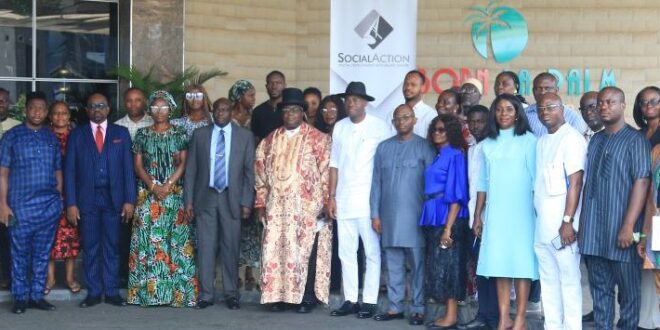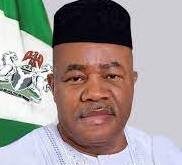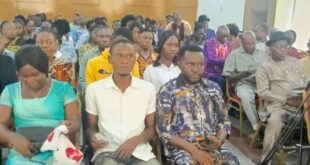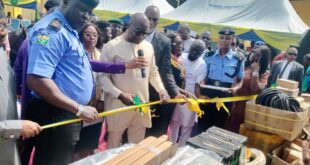By Mandy Tina
Civil Society Organizations and stakeholders in the Niger Delta region have advocated for community accountability to ensure transparency in the management of proceeds from natural resources, particularly oil and gas.
This was made known in a summit organized by Social Development Integrated Center, also known as Social Action, in collaboration with the Independent Corrupt Practices and Other Related Offences Commission (ICPC), in Port Harcourt, with the theme ‘Building the Niger Delta Hope: Collaborating for Inclusive Development and Public Accountability.’
The event which drew stakeholders from both the private and public sectors, including traditional rulers, anti-corruption agencies (ICPC) academia, CSOs, media, community leaders, policymakers, industry professionals, focused on strengthening accountability in the development process, promoting discussion on enthroning accountability in International Oil Companies’ (IOC’s) divestment and the need to address historical environmental challenges that plague the region.
In his keynote address, secretary to the Independent Corrupt Practices and Other Related Offences Commission (ICPC), Clifford Oparodu, lamented that despite the Niger Delta playing a pivotal role in the nation’s economy, the region still experience’s widespread of poverty.
“The concept note for this summit states clearly that the Niger-Delta is the heartland of Nigeria’s hydrocarbon wealth and that the Niger-Delta plays a pivotal role in the nation’s economy as its primary oil producing region.
“It goes further to say that the discovery of crude oil in Oloibiri, Bayelsa state marked a significant turn in Nigeria’s economic fortune as it accounts for 90% of the nation’s foreign exchange earnings and 80% of government budget. This rosy position above should ordinarily translate to prosperity and development for the citizens and inhabitants of this region but unfortunately that is not the case.
“Instead, what we see is widespread poverty. pollution, severe environmental degradation, decline and threat to traditional livelihoods, decaying social infrastructure, short-changing of the people and communities in infrastructural projects design and implementation, marginalisation of the indigenous people by their own local leaders and others in the distribution of resources and opportunities accruing from the wealth of the land.
“These we have seen over the years have led to unrest and agitation for equitable resource distribution and control. This agitation has created palpable tension across the region over the years.
“To tell the truth, with the level of exploration and exploitation of petroleum and natural gas resources going on in the Niger-Delta region of the country, the people of this region are greatly affected by this activity and its attendant environmental degradation as well as the socio-economic difficulties imposed on the people in their daily attempts to earn a living and enjoy sustainable development initiatives.
“Therefore, the need for critical stakeholders such as your good selves coming together to discuss the prospects, challenges and the tasks at hand on the way forward, becomes imperative if we must move to the next level with renewed hope”.
Dr. Isaac Osuoka, director of Social Action International, who was represented by the Director Programmes, Isaac Botti, demand that no further divestment approval should be given to any international oil company.
“We reiterate our demand of President Bola Ahmed Tinubu, made by community members on the streets of Port Harcourt and by civil society leaders: no further divestment approvals should be granted to any international oil company, Shell in particular, until there is a definitive, enforceable, and transparent mechanism that compels these corporations to address their legacies of environmental degradation and social abuses in the Niger Delta comprehensively and ethically.
“The era of overlooking the ramifications of decades of environmental neglect and social disenfranchisement must end. We demand concrete actions from President Bola Ahmed Tinubu that not only match the magnitude of the ecological devastation and community upheaval experienced but also pave the way for healing and equitable progress.
“Shell’s plan to sell off its shares in SPDC should not be perceived as an escape route for a foreign company but as a pivotal opportunity for genuine accountability and remediation.
“This critical juncture calls for the establishment of a robust framework by the federal government and its regulatory agencies, with the participation of civil society and community stakeholders. Such a framework must ensure rigorous environmental cleanup efforts, equitable compensation for affected communities, environmental stewardship and social justice”.
Meanwhile, a 10-point communique reached at the end of the summit includes;
“Removal of opacity in government and community businesses. Protection of all NDDC projects and installations. Monitoring and reporting all NDDC project execution to ensure quality. Civil society organisations must see themselves as part of the community and the adoption and promotion the National Ethics and Integrity Policy (NIEP).
“Promote good governance at all levels – (national, sub-national and community). Sanctions for non-compliance with procurement Act and other statutory laws of the NDDC.
“Niger Delta youth should imbibe the culture of advocating for accountability, transparency (open data / Budget) and hard-work.
“Need for Niger Delta stakeholders to see all executed projects as their own and this will close the gap between the NDDC and the people of the Niger Delta region.
“That there should be inclusivity of all genders for effective collaboration especially during needs assessment.
The NDDC should ensure that needs assessments are carried out in collaboration with various community stakeholders.
“That there must be effective communication and knowledge sharing (possibly in the local language) between the operators (IOCs) and primary stakeholders (Community Gatekeepers & the people) during divestment process and the ongoing energy transition.
“NDDC must have a clearly defined procurement plan for every given year and this must be published.
“The citizens must be knowledgeable enough to ask questions regarding procurement activities in the NDDC and the Niger Delta region in general.
Technology must be deployed in all procurement processes.
“Capacity building training should be organized for stakeholders to aid them in the identification and tackling corruption.
“That there is a need for ICPC to introduce community accountability to ensure judicious use of resources.
“That there should be a state level plan for a Niger Delta beyond oil.
“That there should be a clean-up program for the entire Niger Delta region.
“That there should be a diversification to tourism as it has the potential to generate huge revenue.”
 PH Mundial – Port Harcourt Online Newspaper News Across The Region
PH Mundial – Port Harcourt Online Newspaper News Across The Region





